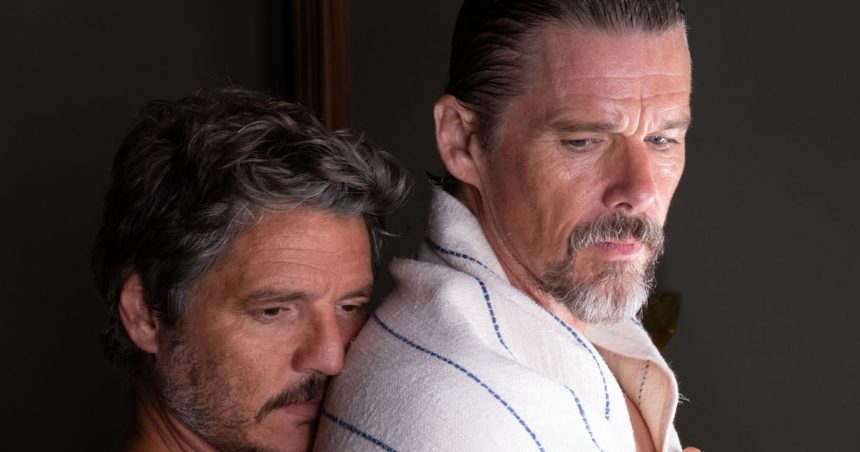This review was originally published on October 6, 2023. Strange Way of Life is now streaming on Netflix.
Two decades ago, Pedro Almodóvar turned down an offer to direct Brokeback Mountain because he was worried that he wouldn’t get the creative leeway to make the film that he wanted. And what he wanted, he told Indiewire, was to show the “animalistic” connection between two men: “For me it was impossible to have that in the movie because it was a Hollywood movie. You could not have these two guys fucking all the time.”
There’s a certain amount of irony to the fact that, having finally made a queer Western romance of his own, Almodóvar opted to do so on the tab of Yves Saint Laurent, with costumes done by the brand’s creative director, Anthony Vaccarello. Presumably, he was given all the freedom he wanted, but the result — a half-hour effort entitled Strange Way of Life — still feels like it’s midway to an ad, in part because of the sumptuousness of the clothes, and in part because, unlike the 2020 short it’s being shown in theaters with, it never really commits to being a film. It’s a gorgeous but unsatisfying sketch of a thing, and it has such a tough time creating a sense of history around its thwarted lovers that it’s almost laughable.
Those lovers, Silva and Jake, are played by Pedro Pascal and Ethan Hawke as middle-aged men, though it’s only when they’re younger, and played by José Condessa and Jason Fernández, that we see the hectic lust Almodóvar was so interested in. As wild gunslingers, Silva and Jake spent two months together, a period we glimpse via a memory of the time they broke into a wine cellar in the company of some working girls and ended up in each other’s arms instead.
Maybe it’s meant to feel like a fever dream, those hectic images of two model-handsome young men rolling around together in puddles of alcohol. But it might as well be a scene from a different movie, or just a different photo shoot, so impossible is it to connect to the moody people the pair have become, or the very different-looking actors playing them. Jake, after turning down Silva’s suggestion that they buy a ranch together, has become sheriff of the town of Bitter Creek, while Silva has been across the desert working with horses, and when the film begins, they’re reunited for the first time in 25 years. While Silva’s visit is not without ulterior motives, it doesn’t take long for the two to end up back in bed together, albeit with a cut to black after their initial clinch.
Why the young Jake and Silva get that cartoonishly voluptuous scene while the older Jake and Silva have sex decorously offscreen has less to do with time or age than it does a failure of imagination. Strange Way of Life doesn’t have any sense of conviction in what its grown men are supposed to have been doing in those intervening years. They have boatloads of backstory to be unloaded over dinner and during the morning after, with Silva’s son, Joe (George Steane), being the prime suspect in the murder of a local woman who happens to be the widow of Jake’s brother, someone he vowed to protect (and maybe also had an affair with). If the flashback reads like a fantasy of unfettered and un-frowned-upon desire, complete with the sex workers striding off like fairy godmothers, laughing that they “have nothing to do here,” the convoluted offscreen crime is a much more awkward means of showing the masculine obligations Jake and Silva have become trapped by.
Having reunited its lovers, the film seems reluctant to have to saddle them with a conflict that ends up feeling ridiculous. It ends where it feels like it wishes it began, in a scene of tender domesticity surrounded by improbably chic trappings. Almodóvar has always been an impeccably stylish director, but the lushness of Strange Way of Life’s interiors, of the uniformly beautiful young men filling out the cast, and the runway-ready jacket Pascal wears (inspired by Jimmy Stewart’s in Bend of the River, but in a shade of emerald green that wouldn’t last a day in the sun) give this film a catalogue-page unreality. It would have been better off relinquishing its half-formed ideas and just coasting by on vibes.
More From NYFF











